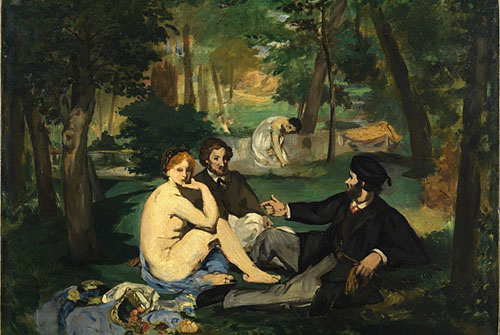Project includes renovation of gallery in Somerset House and a new online archive for more than one million images
Déjeuner sur l’herbe by Édouard Manet (1862–1863). Image: Samuel Courtauld Trust
The Courtauld Institute of Art in London has launched a £50m redevelopment programme celebrating its founder’s vision that “art is and must be for all”. The specialist art history and conservation institute, the UK’s smallest university, has secured funding towards the first phase of Courtauld Connects, a plan to overhaul the Courtauld Gallery in Somerset House, digitise more than a million images from the photographic collections and forge educational partnerships in the UK’s regions. Initial funding includes a £9.4m grant from the Heritage Lottery Fund and £9m from the Courtauld donors.
The London-based architects Witherford Watson Mann are to restore and expand the display areas for the gallery’s prestigious collection, which houses masterpieces by Cézanne, Gauguin, Manet and Monet. The transformation—described as the biggest since the gallery and institute were reunited at Somerset House in 1989—will also create a new space for temporary exhibitions and a learning centre. The gallery will be closed for around two years during the refurbishment, from summer 2018 to spring 2020.
Beyond London, the project’s educational mission builds on the legacy of the Courtauld’s public-minded patron, the English textiles industrialist and art collector Samuel Courtauld. A series of partnerships are planned with museums in the former centres of the Courtauld family business, including Preston in north-west England, Norwich in East Anglia, Holywell in Wales and Belfast in Northern Ireland. The gallery is to lend works from the collection to the regions, sending a version of Manet’s Dejeuner sur l’Herbe (1863) to the Ferens Art Gallery in Hull in 2017 for its year as UK City of Culture.
Meanwhile, the Courtauld will work with a crowdsourced team of 10,000 volunteers to conserve and catalogue 1.1 million images from its largely unpublished archives of art and architecture photographs, which will be made available online.
“This is only the first phase; there is still much to do and we have further funds to raise,” says Deborah Swallow, the institute’s director. But for the Courtauld alumnus and the Tate's director Nicholas Serota—who will unveil Tate Modern’s own vast £260m extension in June—the new scheme is “a bold venture that will open the resources of both parts of the Courtauld to new audiences in London, nationally and internationally”.
